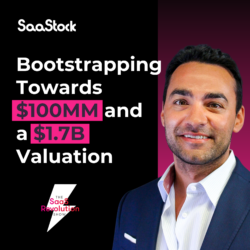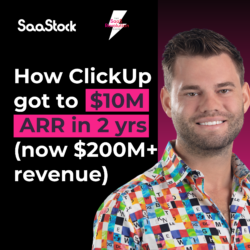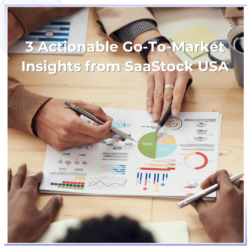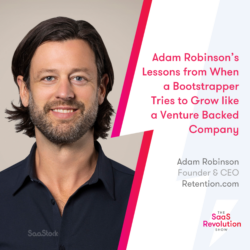In this episode of the SaaS Revolution Show, Alex Theuma sits down with Mike Walrath, CEO of Yext, to explore how AI is reshaping the SaaS landscape and search marketing as we know it.
Mike shares practical insights from decades in tech leadership, covering: how SaaS companies must rethink growth, why services are making a comeback, and what AI means for the future of SEO, marketing, and customer visibility.
You’ll learn:
- Why SaaS businesses must adapt to survive AI disruption.
- How generative AI is changing how people search.
- What marketers need to do to stay discoverable in the LLM era.
- Leadership advice for founders and CEOs in SaaS.
- Yext’s transformation and lessons from the frontlines.
AI isn’t killing SaaS but it is changing the rules
“This notion that AI is going to kill SaaS is a bad take. But I think it’s going to fundamentally change it.”
According to Mike, AI isn’t going to kill SaaS but it will force us to revisit assumptions they’ve relied on for the last 15-20 years.
For most of its rise, the industry rewarded what Mike refers to as software “purity”. That is building products that customers can onboard and use independently. But as AI automates more routine tasks, customers are expecting more meaningful outcomes, and it’s showing cracks in the existing model.
AI is changing:
- The real job your product is being hired to do.
- How much support customers expect built-in.
- The kind of data and experience that drive trust and results.
Ultimately, it means that software can’t sit on its own anymore. It has to solve the full problem.
Why AI means the return of services in SaaS
“If you’re not coming to the customer with a complete solution to their problem, then I think you’re going to have a really hard time.”
Historically, SaaS companies have leaned away from services. They were costly, complicated, and hard to scale.
But in the AI era, they could be your differentiator.
Customers today want outcomes not just access to a product. They expect services as part of the package.
“In the new world, you have to deploy services. It’s going to be a more profitable business because you can bring AI to the table and you can automate a lot more of the services work.”
Mike pointed to companies like ServiceNow and Palantir as examples of companies who once faced criticism for their reliance on services but are now thriving.
Though he believes that this shift will impact the IT services market more than SaaS, SaaS founders will still have to adapt as how you deliver value becomes a key differentiator.
Staying discoverable: What AI means for search
“The Google monopoly is quickly falling apart when it comes to where consumers ask questions.”
Search is no longer dominated by one platform. Tools like ChatGPT, Perplexity, Claude, and Grok are changing how people search and, crucially, how questions are answered. It’s making traditional SEO tactics less effective and has big implications for marketers.
Mike explained this change with a simple example search: Tacos near me
“Tacos near me isn’t tacos near me anymore. It’s tacos near me that don’t have seed oils, that are allergy free…”
In this example, tools like ChatGPT can bring in context and memory that we don’t get from Google (yet).
A user might tell ChatGPT they’re vegan or have a nut allergy — and it will remember that. So even a simple query gets interpreted through a personalised lens.
That makes every prompt unique. And it changes how marketers need to think about discoverability.
In other words, tactics to satisfy Google results pages like keywords, backlinks, and technical SEO still matter, but they aren’t enough on their own. Now, visibility depends on what data these AI models can access and understand — and whether they see your business as a good fit for the person behind the prompt.
“What marketers have to understand is that the way these systems are going to answer those questions is going to be: what data are you making available to me, through all the different ways that I may access that data, so that I can give the best recommendation?”
Advice for SaaS founders and CEOs
Mike’s overarching advice is to stop following the old playbooks that were built in a different market, including the founder tendency to over-index to the point of view of investors:
“Investors have a valid point of view on how value gets created but they tend to be focused on their timeframe and how their business works…Their advice is geared towards maximum risk and maximum output. That’s not always the best advice for founders.”
Instead, sharing a learning from his time at Yext, he advises using your own judgement to determine whether advice is correct for your stage of business:
“[At Yext] we overspent to maintain a growth curve when the market dynamics weren’t allowing it. And we became highly inefficient. It’s taken us years to break out of that pattern.”
Recommended media
Learn more about the impact of AI on SaaS from the founders and CEOs leading the way.
- GTM efficiency, AI, and the future of SaaS sales with Jen Igartua (Go Nimbly)
- Inside the AI playbooks of Superhuman, Chili Piper, and Skaled
- What makes a great SDR in the AI era?
- Tomasz Tunguz predicts the impact of AI on SaaS





